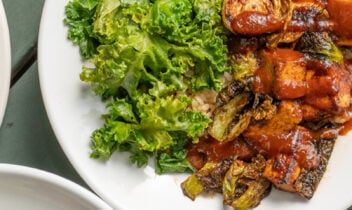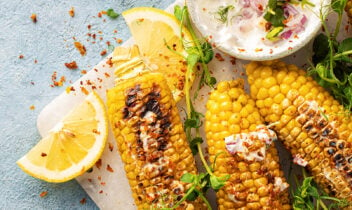
The ABCs Of Food Rooted In A Better Mood®
Our mental health is an important focus during the month of May which is Mental Health Awareness month. This provides a gentle reminder to notice our stress and mood and implement an action to reduce stress or improve mood. Actions to take include physical activity, breathing exercises, meditation, mindfulness, or a change in dietary habits. To have some fun, we will use the alphabet to learn more about plants and how what we eat can elevate our mood.
Produce can be a superstar for helping to ward off stress and anxiety. If food plays a part in mood, then what are the ABCs of food rooted in a better mood to help us feel our best? Reach for one of these ABC picks when a stress-induced craving hits and include plenty of fruits and vegetables daily to benefit your mood.
A=
Avocado
Avocados with their ultra-creamy texture are rich in omega-3 fatty acids and many additional vitamins and minerals. These fatty acids are good for brain health, improving mood and our sense of wellbeing. If you need another reason to love avocados, they are great at maintaining normal production of hormones which can affect mood when not in balance. Enjoy an avocado sliced as a topping on a salad, sandwich, Mexican entrée, or breakfast toast.
Arugula
Dark green leafy vegetables such as arugula, spinach, swiss chard, or kale are rich in stress-busting magnesium to help balance the body’s stress hormone, cortisol, and it also plays a role in regulating blood pressure. In addition, chronic stress may reduce the body’s magnesium stores making this mineral even more important during times of stress. Add dark green leafy vegetables to an omelet, salad, soup, sandwich, pesto sauce, or a smoothie.
Asparagus
Asparagus is a good source of folate, which is part of the calming B-complex vitamin known for reducing the feelings of stress and anxiety. If repleting a folate deficiency, it can reinstate the happy hormone levels. Folate helps increase levels of serotonin and dopamine in the brain, so we can turn that frown upside down. Just 1/2 cup of cooked or raw asparagus provides 134 mcg of folate which is 34% of an adult’s folate needs. In addition, asparagus, along with many other fruits and vegetables, is a good source of antioxidants to promote overall good health. Load up on folate and other nutrients in this delicious roasted asparagus with tomatoes. https://www.savoryonline.com/recipes/148419/roasted-asparagus-with-blistered-tomatoes
B=
Banana
Bananas are a good source of potassium which helps to keep blood pressure low. Eating more potassium-rich fruits and vegetables is a great way to help keep your blood pressure in a healthy range. Bananas are also a source of magnesium. Magnesium may help with brain functions that reduce stress, irritability, and anxiety. It can help regulate emotions. Besides peeling and enjoying, bananas can be baked into breads or muffin mixes, enjoyed frozen as a chocolate-dipped pop or banana ice cream mixture, added to a smoothie, oatmeal, peanut butter sandwich, or made into creative little banana sushi snacks.
Broccoli
Just a ½ cup of broccoli provides 11 micrograms chromium, which is almost 50% of the recommended daily intake. This trace element works to regulate mood and reduce anxiety. Broccoli is delicious with a little olive oil and garlic, then roasted, grilled, stir-fried or added to a creamy casserole. For a unique creamy side loaded with nutrients, try a broccoli potato mash. https://www.savoryonline.com/recipes/151636/broccoli-potato-mash-with-pecans
Berries
These brightly colored fruits contain high levels of polyphenols, which helps protect the body against inflammation and may help manage depression and anxiety. Berries also contain anthocyanins which may reduce symptoms of depression up to 39%. Try berries on a fruit kabob, in a smoothie or use sliced berries to top a peanut butter sandwich, waffle, oatmeal, yogurt, or ice cream. Need a to cool down? Try this Mixed Berry Sorbet and it will be sure to make smiles. https://www.savoryonline.com/recipes/153982/mixed-berry-sorbet
C=
Citrus
Citrus fruits such as oranges, grapefruits, lemons, and limes are rich in the antioxidant vitamin C. These antioxidant properties may reduce inflammation to prevent anxiety. Even the scent of lemons and oranges has been linked to reduced stress. Vitamin C can curb levels of stress hormones such as cortisol while strengthening the immune system. Sneak a little citrus flavor along with the beneficial vitamin C into your cooking by squeezing a little lime juice on chicken, lemon zest onto grilled salmon or orange into grilled vegetables.
Cabbage
Cabbage is a natural prebiotic food meaning the fiber in it provides fuel for the good bacteria in our large intestine. Once the cabbage is fermented in lactic acid bacteria to make sauerkraut or kimchi, you now have a good source of probiotics which supports gut health. Since most of the body’s serotonin level is produced in the gut, making gut health a priority may correspond to a good mood. Probiotics may play a role in boosting mood, improving cognitive function, and relieving symptoms of stress. Probiotics can support immune health. Any way that cabbage is enjoyed, whether fermented, raw, or cooked, our gut will be happy we chose to eat it.
Carrots
Carrots get most of their orange color from the antioxidant beta-carotene. This antioxidant when combined with other antioxidants such as vitamins C and E, may help people that are suffering from depression or anxiety feel better. Also, the act of munching on a crunchy food such as carrots or celery, can help beat the feeling of stress without providing too many calories. Dip carrots in hummus, add to stir-fry meals, stews, soups, or shred carrots into baked goods such this Carrot Fritter recipe. https://www.savoryonline.com/recipes/104106/carrot-fritters
Enjoying a colorful variety of fruits and vegetables is a sure way to get fiber, vitamins, and minerals as well as all the stress-fighting properties you need to have a calmer spring.


